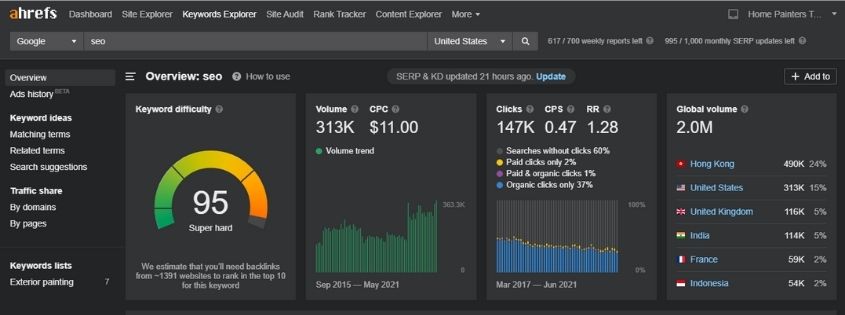SEO also known as search engine optimization, is the practice to increase your online visibility through organic search results.
Whenever a person searches for a certain product and service, that is related to your business in Google or other popular search engines.
The first thing that you do is type in some keywords that are relevant and fits your needs.
The better visibility your pages have in search results, the more likely you are to gather attention and attract prospective and existing customers to your business.
Through SEO, your site will be able to attract potential quality and quantity of website traffic.
Because of the rising competition and many businesses that share the same niche as you, it is vital for you to rank on top of search engines.
Because users search only through the first page for search engines and find what best fits their needs.
You need to find a way to rise on top if that competition and stay one step ahead of your competitors.
In general, through SEO, you can achieve a much higher return on investment and online growth of your company by means of increased online visibility.
So, are you prepared to gain a much comprehensive knowledge about SEO, and get all your commonly asked questions answered?
“Questions like, why is SEO important for business?” Or “what benefit will SEO provide to my business?”
This article will cover all the perspective and everything you need to know about the meaning of SEO.
Every marketer and business owner need to have a good know-how of how SEO words and why it is valuable and important.
And as Google keeps evolving, what strategies you need to learn and change in an ever changing SEO environment to get amazing results.
What is SEO & Why is it Important?
You must be familiar of what SEO is and if you haven’t already then this guide will easily give you a quick understanding of what SEO is.

It is the process of optimizing, and affecting the brand visibility of a particular website or a certain web page in a search engine.
It is usually unpaid and you gain results and increased traffic through organic search results.
But this SEO meaning still does not provide you with an answer to most of the important questions for your business and your website. Such as:
- What is the process or optimizing your content or your company’s site?
- How is your site’s organic search visibility increased? How can your content easily be found on local search engines?
- How would I get an idea on how to spend time on SEO?
- How can I differentiate between good and bad or harmful SEO advice?
What is a major cause of concern of majority of the business owners or employees is how SEO can actually help attract more potential traffic, leads, boost sales and ultimately earn more revenue and profit for your business.
SEO is all about achieving those numbers.
Why Do Most Businesses Care About SEO?
Many people search for business products or services that they need. So that traffic is what a business desires. The kind of potential traffic which is very specific, high-intent traffic.
- Keyword Research & Keyword Targeting Best Practices
- The first thing that you do is search for relevant type of keywords.
- So that you can target those keywords on your content and optimize accordingly.
- You need to determine what you actually are trying to optimize you content for.
- You need to identify the terms that most people are using to search your product or service (which is also known as keywords) that you would want your website to rank for at the top in popular search engines like Google.
There are a few key factors that you need to consider when determining the keywords that you would want to specifically target on your site.
Search Volume:
The first and foremost thing that you need to determine is the volume of a certain keyword.

The more people there are that are searching for that keyword, the more audience you will be reaching.
On the contrary, if no one is searching for the keyword that you are targeting, there will be no audience available that will be searching for your content through organic search.
Relevance:
If the certain keyword that you have picked is more regularly used and searched for then that is amazing. But the main problem arises when it is not completely relevant to your predictions?
Relevance is pretty much straight forward. For instance, if your business is dealing in digital marketing, then you do not want to show up for searches that have nothing to do for your business. Like “pet food”.
But what about key phrases like “Best digital marketing software?”
This might look like an amazing description of what you deal in but if you are trying to sell your software to the Fortune 100 companies.
Then most of the traffic that you want to drive for this very complex and competitive term will be for the searchers that will not be very interested in buying your software.
And the people who would be interested in buying your expensive, complex software would not be able to reach you because of your ranking based on a simple Google search.
On the contrary, you might also think a vague keyword like “best enterprise PPC marketing solutions” would be totally irrelevant to your business since you do not deal in that particular stuff.
Competition
When you consider SEO, you take in account all the potential costs that come your way and the probability of success. In SEO, this most certainly means that you do a thorough competitor analysis and understand the relevant competition and the possibility to rank on top of popular search engines for particular terms.

At first, you need to first gain an understanding of your target audience, who they are and what they are most likely searching for.
If you do not have a proper know-how of who your targeted audience are, giving it a thought is a good place to start for your business and especially for SEO.
And at that point, you would want to gain a comprehensive understanding of:
- What kinds of products or services they are interested in?
- What problems do they have and how to solve them?
- The language they use or understand to describe the things that they do or are interested in, the tools the use and much more?
- Who are your competitors in the market and who are your prospects currently buying from?
SEO focuses on organic, not paid search result rankings
If you truly want to know the complete meaning of what does SEO mean then it is not complete without discussing about organic or paid search results.
You must keep in mind that SEO helps you earn more online visibility in search results. It is however critical to know that SEO targets only organic search results.
If you type in a certain keyword in Google, then you would see in search results that many of them include paid and organic search results.
A paid search result is basically an ad which is promoting a business and its services.
Paid ads usually tend to appear first in search results. Even then it is still essential for you to earn a top spot in organic search results, which follow paid search results.
That is because of the sole reason that paid ads are not free. When a user clicks on your ad, you need to pay for it.
On the contrary, in organic search results, you do not have to pay anything if a person clicks on your site and it is organically ranking on top.
Did You Know?
70 percent of clicked search results are organic
This means that majority of the users click on organic results rather than the paid ones.
That doesn’t mean PPC advertising isn’t useful.
This most certainly does not mean PPC advertising isn’t useful and does not come in handy.
PPC is also another excellent digital advertising tool, it can also be used as a strategy that supports SEO.
The major advantage of PPC is that it gives your company immediate visibility in search results, which is helpful because SEO takes time almost a few months to show results.
SEO takes months to show results
So the meaning of SEO for many is an ongoing and financially rewarding commitment.
Many businesses tend to invest in SEO and expect to gain immediate results.
If you are planning to optimize an existing website content according to the latest Google updates and strategies or planning to launch a brand-new set of pages. It is totally unfair to expect that your company will see results and a changing in rankings overnight.
That is because SEO is time consuming. In majority of the cases, it can take more than a few months for your team to see a change a change in your rankings.
Some of the factors, like how old is your website and the history that is has with Google can shape your company’s timeline greatly.
If you are good at creating useful and quality content and promoting it, then it will be great to shift your focus there.
If you have a large site which is also complex in nature then it will be highly useful for you to get the technical SEO right or like most cases, hire someone to do so.
If you have a small business that would benefit from ranking for very geo-focused terms but not on anything else then you need to focus more on local SEO efforts. After that maybe focus on other marketing efforts if you see that you are not getting any results from there.
The Bottom Line:
Always keep in mind that the sole objective with any type of search engine optimization efforts is to gain more exposure and potential traffic for your business or your site’s content.
Search for many ways that search engine traffic can help your business and site. Be very focused and vigilant on any new policy or any recommendation that Google makes that might improve your search rankings.
Farah Khan
Farah is an ambitious content manager and is dedicated in creating, improving and maintaining content to achieve our business goals at Artimization.
 Make Custom Package
Make Custom Package



No Comments